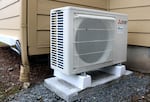Oregon is looking for contractors to help kickstart a new heat pump incentive program, as part of the state’s ongoing push to reduce carbon emissions by supporting a move toward more efficient home heating and cooling systems.
The Oregon Department of Energy’s Oregon Heat Pump Purchase Program aims to help homeowners, rental property owners and builders of new homes by providing up to $2,000 in rebates. But first, the department is looking for eligible contractors to help.
The contractor’s role is to install the heat pump, apply for the incentive through the agency and pass the full savings on to the homeowner or property. That way homeowners or property owners are not paying those costs upfront, ODOE energy incentives manager Duard Headley said.
For a limited window after the program opens, qualifying Oregonians may be able to cut the price of a home heat pump installation by a combined $4,000. That’s if they participate in both the state incentive program and also get a clean energy federal tax cut.
The IRS is offering up to $2,000 in energy efficiency credits on heat pumps and other energy projects completed this year, but a Trump-backed federal funding bill might end that program after 2025.

FILE - A heat pump unit installed in an affordable housing unit in Eugene. Heat pumps are energy efficient and can help lower electricity bills.
Monica Samayoa / OPB
Since opening applications on Wednesday, Headley said the agency has already seen several contractors who are enrolled in other state heat pump programs apply.
The agency is hoping to allow the public to start applying for these incentives on June 17.
“On June 17, contractors will be able to apply for incentive reservations or incentive applications on behalf of homeowners, the property owners, and developers,” he said.
“Part of the eligibility for an incentive is that the heat pump is installed after the program opens on the 17th, so we’re expecting to see those applications kind of ramp up over time, because it will take contractors some time to complete those installations.”
Related: Oregon awarded nearly $200M in federal funding to boost climate action programs
Over the past two years, the Oregon Department of Energy has encouraged heat pump installations across the state through federal- and state-funded programs. In 2023, legislators passed the Climate Resilience Package that included a goal to install 500,000 heat pumps by 2030.
The agency expects homes in the state to add 12,000 units in the next few years through the Oregon Heat Pump Purchase Program. The program is funded through the federal government’s Climate Pollution Reduction Grant, which awarded Oregon $197 million last year.
The aim is to help reduce greenhouse gas emissions by installing energy efficient appliances like heat pumps, while providing a means for cooling or heating to the residents receiving the heat pump. Heat pumps are more efficient at cooling than traditional air conditioning systems, and produce lower carbon emissions than typical natural gas or electric furnaces.
Depending on the size of the home and what kind of unit each home would need, heat pumps can range from $6,500 to $20,000.
Headley said the program expects to distribute incentives in two rounds of funding in 2025 and 2027.
“We just want to make sure that we’re spreading that out over time and giving everyone a good opportunity to participate in the program,” he said.
Related: Oregon is getting hotter. This state program is helping thousands of renters stay cool
The agency will also limit how many incentives each contractor can claim — up to 50 per quarter or 200 per year — to give other contractors, especially in rural areas, a better chance to claim the incentive.
“In the first few days that the program opens, we will definitely see a lot of action then, we’re already seeing a lot of activity with contractors registering, but it won’t be the same situation where funding rapidly is consumed,” Headley said.
Headley was referring to the agency’s Rental Heat Pump Program, which ran out of funding within months during its first year of operation. Lawmakers allocated an additional $4 million last year — that funding was exhausted in less than 48 hours.
Interested contractors can apply online to join the approved list.
